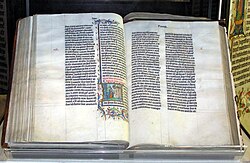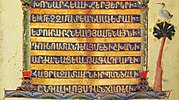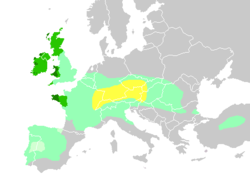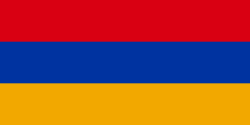The Bible (Armenian: Աստուածաշունչ, 'Breath of God') has been translated to Armenian since the beginning of the fifth century. The invention of the Armenian...
4 KB (412 words) - 04:06, 28 January 2025
translations. In some cases, different translations have been used as evidence for or have been motivated by doctrinal differences. The Hebrew Bible was...
54 KB (6,690 words) - 04:53, 26 March 2025
China, the Bible has been translated into many varieties of the Chinese language, both in fragments and in its totality. The first translations may have...
32 KB (3,795 words) - 21:59, 7 January 2025
Arabic: Bible translations into Arabic Aramaic: Bible translations into Aramaic, Targum Armenian: Bible translations into Armenian Assamese: Bible translations...
22 KB (1,937 words) - 01:12, 9 March 2025
not included in modern English translations are verses of the New Testament that exist in older English translations (primarily the New King James Version)...
152 KB (19,276 words) - 08:41, 21 February 2025
Part of the Bible was first available in the Kurdish language in 1856. Modern translations of the whole Bible are available in standard Kurmanji and Sorani...
10 KB (753 words) - 10:45, 26 February 2025
developments connecting Armenian to Balto-Slavic languages. The Armenian language has a long literary history, with a 5th-century Bible translation as its oldest...
115 KB (8,430 words) - 17:25, 31 March 2025
but "Proto-Armenian" is a term that has become common in the field. The earliest attestation of Armenian is the 5th-century Bible translation of Mesrop...
29 KB (2,289 words) - 22:03, 11 March 2025
were the Indo-Iranian speaking pastoralists who migrated from Central Asia into South Asia and introduced the Proto-Indo-Aryan language. The early Indo-Aryan...
20 KB (1,598 words) - 12:07, 8 April 2025
Greek is often argued to have the closest genetic ties with Armenian (see also Graeco-Armenian) and Indo-Iranian languages (see Graeco-Aryan). The following...
14 KB (1,409 words) - 22:05, 14 February 2025
Biblical canon (redirect from BooksOfTheBible)
ecumenism more recent Catholic translations (e.g., the New American Bible, Jerusalem Bible, and ecumenical translations used by Catholics, such as the...
134 KB (12,214 words) - 17:11, 24 March 2025
classification schema, the split of the former into Gaelic and Brittonic is seen as being late. The distinction of Celtic into these four sub-families most likely...
71 KB (5,912 words) - 11:49, 11 April 2025
spread out from Anatolia with agriculture beginning c. 7500–6000 BCE, the Armenian hypothesis, the Paleolithic continuity paradigm, and the indigenous Aryans...
66 KB (6,015 words) - 19:39, 3 April 2025
Albanian, Armenian, and Greek a common evolution and semantic shift in the post PIE period is PIE *mel-i(t)- 'honey', from which Albanian bletë, Armenian mełu...
35 KB (3,489 words) - 20:41, 2 March 2025
Armenians (Armenian: հայեր, romanized: hayer, [hɑˈjɛɾ]) are an ethnic group and nation native to the Armenian highlands of West Asia. Armenians constitute...
111 KB (10,524 words) - 14:17, 12 April 2025
Persian Alānān (plural); Arabic Alān (singular); Syriac Alānayē; Classical Armenian Alank'; Georgian Alaneti ('country of the Alans'); Hebrew Alan (pl. Alanim)...
62 KB (6,656 words) - 09:16, 4 April 2025
The Armenian hypothesis, also known as the Near Eastern model, is a theory of the Proto-Indo-European homeland, initially proposed by linguists Tamaz V...
24 KB (2,795 words) - 15:59, 29 June 2024
survival of some remnants is possible, the Isaurian language may have survived into the Late Antiquity, with funerary inscriptions recorded for as late as the...
11 KB (1,100 words) - 05:02, 9 December 2024
significant increase in the quality and quantity of translations. The Bible was first translated into Ottoman Turkish in the 17th century by Wojciech Bobowski...
10 KB (726 words) - 20:55, 28 January 2025
to give an idea of the sound changes involved. This is not a list of translations: cognates have a common origin, but their meaning may be shifted and...
77 KB (7,583 words) - 07:39, 26 March 2025
in Armenian." In Pavel S. Avetisyan, Yervand H. Grekyan (eds.), Bridging times and spaces: papers in ancient Near Eastern, Mediterranean and Armenian studies:...
45 KB (4,916 words) - 07:13, 2 March 2025
available it is evident that Phrygian shares important features with Greek and Armenian. Phrygian is part of the centum group of Indo-European languages. However...
34 KB (4,446 words) - 20:20, 13 March 2025
Balto-German-Slavonic language, out of which Proto-Balto-Slavic (later split into Proto-Baltic and Proto-Slavic) and Germanic emerged. Schleicher's proposal...
39 KB (4,186 words) - 07:00, 9 April 2025
language contact between a language related to Romani and Domari and the Armenian language. Parya is spoken in Tajikistan and Uzbekistan by the descendants...
77 KB (5,831 words) - 06:19, 11 April 2025
The New World Translation of the Holy Scriptures (NWT, also simply NW) is a translation of the Bible published by the Watch Tower Bible and Tract Society;...
80 KB (9,906 words) - 02:22, 9 April 2025
epigraphy Gaulish epigraphy Runic epigraphy Ogham Gothic Bible Bible translations into Armenian Tocharian script Old Irish glosses Albanian Kanun Origins...
2 KB (89 words) - 23:45, 28 March 2025
may come from a Celtic ethnic name, perhaps borrowed into Latin during the Celtic expansion into Italy from the early fifth century BC. Its root may be...
148 KB (16,581 words) - 22:54, 9 March 2025
about 1650 BC. Armenian, attested from the early 5th century AD. It evolved from the Proto-Armenian language which, according to the Armenian hypothesis,...
112 KB (10,331 words) - 04:41, 10 April 2025
changed into monophthongs shortly before (i.e., within a century of) the time of Wulfila, who designed the Gothic alphabet and wrote the Gothic Bible c. 360...
94 KB (9,675 words) - 15:14, 31 March 2025
the only source of information about the Hittites had been the Hebrew Bible. Francis William Newman expressed the critical view, common in the early...
108 KB (12,392 words) - 14:42, 26 March 2025

















